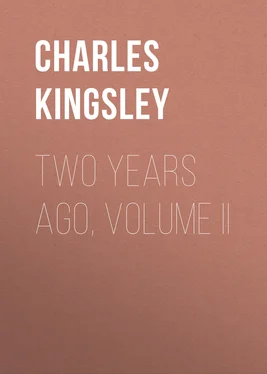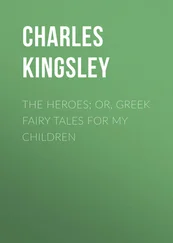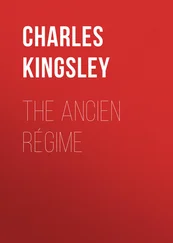Charles Kingsley - Two Years Ago, Volume II
Здесь есть возможность читать онлайн «Charles Kingsley - Two Years Ago, Volume II» — ознакомительный отрывок электронной книги совершенно бесплатно, а после прочтения отрывка купить полную версию. В некоторых случаях можно слушать аудио, скачать через торрент в формате fb2 и присутствует краткое содержание. Жанр: foreign_prose, literature_19, foreign_antique, на английском языке. Описание произведения, (предисловие) а так же отзывы посетителей доступны на портале библиотеки ЛибКат.
- Название:Two Years Ago, Volume II
- Автор:
- Жанр:
- Год:неизвестен
- ISBN:нет данных
- Рейтинг книги:4 / 5. Голосов: 1
-
Избранное:Добавить в избранное
- Отзывы:
-
Ваша оценка:
- 80
- 1
- 2
- 3
- 4
- 5
Two Years Ago, Volume II: краткое содержание, описание и аннотация
Предлагаем к чтению аннотацию, описание, краткое содержание или предисловие (зависит от того, что написал сам автор книги «Two Years Ago, Volume II»). Если вы не нашли необходимую информацию о книге — напишите в комментариях, мы постараемся отыскать её.
Two Years Ago, Volume II — читать онлайн ознакомительный отрывок
Ниже представлен текст книги, разбитый по страницам. Система сохранения места последней прочитанной страницы, позволяет с удобством читать онлайн бесплатно книгу «Two Years Ago, Volume II», без необходимости каждый раз заново искать на чём Вы остановились. Поставьте закладку, и сможете в любой момент перейти на страницу, на которой закончили чтение.
Интервал:
Закладка:
"I must read it," said Valencia. "You must lend it me, Saint Père."
"Not yet, I think."
"Why?" whispered she, pouting. "I suppose I am not as pure as Grace Harvey?"
"She has the children to educate, who are in daily contact with coarse sins, of which you know nothing—of which she cannot help knowing. It was written in an age when the morals of our class (more shame to us) were on the same level with the morals of her class now. Let it alone. I often have fancied I should edit a corrected edition of it. When I do, you shall read that."
"Now, Miss Harvey," said Mellot, who had never taken his eyes off her face, "I want to turn schoolmaster, and give your children a drawing lesson. Get your slates, all of you!"
And taking possession of the black board and a piece of chalk, Claude began sketching them imps and angels, dogs and horses, till the school rang with shrieks of delight.
"Now," said he, wiping the board, "I'll draw something, and you shall copy it."
And, without taking off his hand, he drew a single line; and a profile head sprang up, as if by magic, under his firm, unerring touch.
"Somebody?" "A lady!" "No, 'taint; 'tis schoolmistress!"
"You can't copy that; I'll draw you another face." And he sketched a full face on the board.
"That's my lady." "No, it's schoolmistress again!" "No it's not!"
"Not quite sure, my dears?" said Claude, half to himself. "Then here!" and wiping the board once more, he drew a three-quarters face, which elicited a shout of approbation.
"That's schoolmistress, her very self!"
"Then you cannot do anything better than try and draw it. I'll show you how." And going over the lines again, one by one, the crafty Claude pretended to be giving a drawing lesson, while he was really studying every feature of his model.
"If you please, my lady," whispered Grace to Valencia; "I wish the gentleman would not."
"Why not?"
"Oh, madam, I do not judge any one else: but why should this poor perishing flesh be put into a picture? We wear it but for a little while, and are blessed when we are rid of its burden. Why wish to keep a copy of what we long to be delivered from?"
"It will please the children, Grace," said Valencia, puzzled. "See how they are all trying to copy it, from love of you."
"Who am I? I want them to do things from love of God. No, madam, I was pained (and no offence to you) when I was asked to have my likeness taken on the quay. There's no sin in it, of course: but let those who are going away to sea, and have friends at home, have their pictures taken: not one who wishes to leave behind her no likeness of her own, only Christ's likeness in these children; and to paint Him to other people, not to be painted herself. Do ask him to rub it out, my lady!"
"Why, Grace, we were all just wishing to have a likeness of you. Every one has their picture taken for a remembrance."
"The saints and martyrs never had theirs, as far as I ever heard, and yet they are not forgotten yet. I know it is the way of great people like you. I saw your picture once, in a book Miss Heale had; and did not wonder, when I saw it, that people wished to remember such a face as yours: and since I have seen you, I wonder still less."
"My picture? where?"
"In a book—'The Book of Beauty,' I believe they called it."
"My dear Grace," said Valencia, laughing and blushing, "if you ever looked in your glass, you must know that you are quite as worthy of a place in 'The Book of Beauty' as I am."
Grace shook her head with a serious smile. "Every one in their place, madam. I cannot help knowing that God has given me a gift: but why, I cannot tell. Certainly not for the same purpose as He gave it to you for,—a simple country girl like me. If He have any use for it, He will use it, as He does all His creatures, without my help. At all events it will not last long; a few years more, perhaps a few months, and it will be food for worms; and then people will care as little about my looks as I care now. I wish, my lady, you would stop the gentleman!"
"Mr. Mellot, draw the children something simpler, please;—a dog or a cat." And she gave Claude a look which he obeyed.
Valencia felt in a more solemn mood than usual as she walked home that day.
"Well," said Claude, "I have here every line and shade, and she cannot escape me. I'll go on board and paint her right off from memory, while it is fresh. Why, here come Scoutbush and the Major."
"Miss Harvey," said Scoutbush, trying, as he said to Campbell, "to look as grand as a sheep-dog among a pack of fox-hounds, and very thankful all the while he had no tail to be bitten off"—"Miss Harvey, I—we— have heard a great deal in praise of your school; and so I thought I should like to come and see it."
"Would your lordship like to examine the children?" says Grace, curtseying to the ground.
"No—thanks—that is—I have no doubt you teach them all that's right, and we are exceedingly gratified with the way in which you conduct the school.—I say Val," cried Scoutbush, who could support the part of patron no longer, "what pretty little ducks they are, I wish I had a dozen of them! Come you here!" and down he sat on a bench, and gathered a group round him.
"Now, are you all good children? I'm sure you look so!" said he, looking round into the bright pure faces, fresh from Leaven, and feeling himself the nearer heaven as he did so. "Ah! I see Mr. Mellot's been drawing you pictures. He's a clever man, a wonderful man, isn't he? I can't draw you pictures, nor tell you stories, like your schoolmistress. What shall I do?"
"Sing to them, Fred!" said Valencia.
And he began warbling a funny song, with a child on each knee, and his arms round three or four more, while the little faces looked up into his, half awe-struck at the presence of a live lord, half longing to laugh, but not sure whether it would be right.
Valencia and Campbell stood close together, exchanging looks.
"Dear fellow!" whispered she, "so simple and good when he is himself!
And he must go to that dreadful war!"
"Never mind. Perhaps by this very act he is earning permission to come back again, a wiser and a more useful man."
"How then?"
"Is he not making friends with angels who always behold our Father's face? At least he is showing capabilities of good, which God gave; and which therefore God will never waste."
"Now, shall I sing you another song?"
"Oh yes, please!" rose from a dozen little mouths.
"You must not be troublesome to his lordship," says Grace.
"Oh no, I like it. I'll sing them one more song, and then—I want to speak to you, Miss Harvey."
Grace curtsied, blushed, and shook all over. What could Lord Scoutbush want to say to her?
That indeed was not very easy to discover at first; for Scoutbush felt so strongly the oddity of taking a pretty young woman into his counsel on a question of sanitary reform, that he felt mightily inclined to laugh, and began beating about the bush, in a sufficiently confused fashion.
"Well, Miss Harvey, I am exceedingly pleased with—with what I have seen of the school—that is, what my sister tells, and the clergyman—"
"The clergyman?" thought Grace, surprised, as she well might be, at what was entirely an impromptu invention of his lordship's.
"And—and—there is ten pounds toward the school, and—and, I will give an annual subscription the same amount."
"Mr. Headley receives the subscriptions, my lord," said Grace, drawing back from the proffered note.
"Of course," quoth Scoutbush, trusting again to an impromptu: "but this is for yourself—a small mark of our sense of your—your usefulness."
If any one has expected that Grace is about to conduct herself, during this interview, in any wise like a prophetess, tragedy queen, or other exalted personage; to stand upon her native independence, and scorning the bounty of an aristocrat, to read the said aristocrat a lecture on his duties and responsibilities, as landlord of Aberalva town; then will that person be altogether disappointed. It would have looked very well, doubtless: but it would have been equally untrue to Grace's womanhood, and to her notions of Christianity. Whether all men were or were not equal in the sight of Heaven, was a notion which, had never crossed her mind. She knew that they would all be equal in heaven, and that was enough for her. Meanwhile, she found lords and ladies on earth, and seeing no open sin in the fact of their being richer and more powerful than she was, she supposed that God had put them where they were; and she accepted them simply as facts of His kingdom. Of course they had their duties, as every one has: but what they were she did not know, or care to know. To their own master they stood or fell; her business was with her own duties, and with her own class, whose good and evil she understood by practical experience. So when a live lord made his appearance in her school, she looked at him with vague wonder and admiration, as a being out of some other planet, for whom she had no gauge or measure: she only believed that he had vast powers of doing good unknown to her; and was delighted by seeing him condescend to play with her children. The truth may be degrading, but it must be told. People, of course, who know the hollowness of the world, and the vanity of human wealth and honour, and are accustomed to live with lords and ladies, see through all that, just as clearly as any American republican does; and care no more about walking down Pall-Mall with the Marquis of Carabas, who can get them a place or a living, than with Mr. Two-shoes, who can only borrow ten pounds of them; but Grace was a poor simple West-country girl; and as such we must excuse her, if, curtseying to the very ground, with tears of gratitude in her eyes, she took the ten-pound note, saying to herself, "Thank the Good Lord! This will just pay mother's account at the mill."
Читать дальшеИнтервал:
Закладка:
Похожие книги на «Two Years Ago, Volume II»
Представляем Вашему вниманию похожие книги на «Two Years Ago, Volume II» списком для выбора. Мы отобрали схожую по названию и смыслу литературу в надежде предоставить читателям больше вариантов отыскать новые, интересные, ещё непрочитанные произведения.
Обсуждение, отзывы о книге «Two Years Ago, Volume II» и просто собственные мнения читателей. Оставьте ваши комментарии, напишите, что Вы думаете о произведении, его смысле или главных героях. Укажите что конкретно понравилось, а что нет, и почему Вы так считаете.












